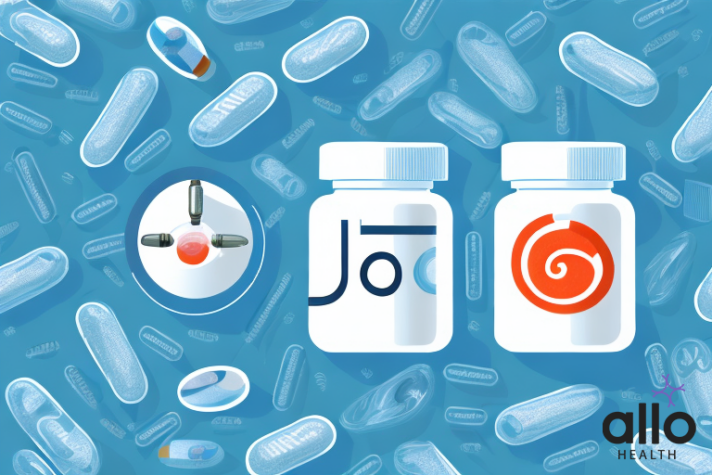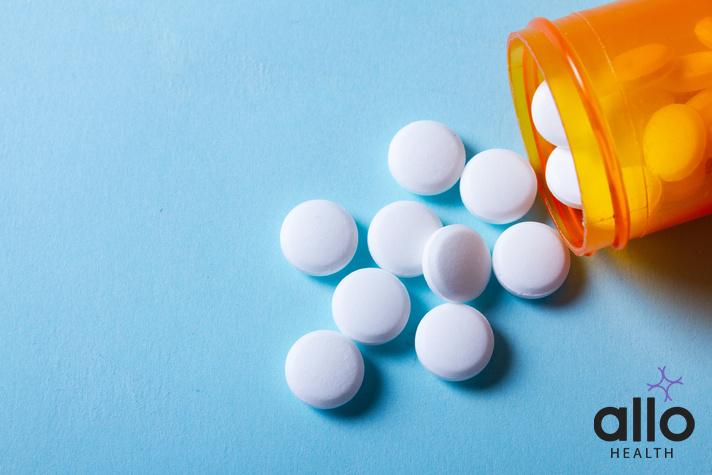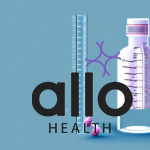Can You Take Tadalafil With Paracetamol?

Allo Health is dedicated to personalized well-being, offering support and trusted information tailored to individual health goals. The platform emphasizes human-generated content, led by a distinguished medical team of experts, including physicians and sexual health specialists. Their commitment to credibility involves rigorous fact-checking, authoritative research, and continuous updates to ensure accurate, up-to-date information. Allo Health's unique approach goes beyond conventional platforms, providing expert-led insights and a continuous commitment to excellence, with user feedback playing a crucial role in shaping the platform's authoritative voice.

Dr. Aditi completed her undergraduate medical education at AJIMS, Mangalore, after which she worked in multi-speciality hospitals with COVID patients and in the Pain and Palliative medicine department. Driven by her experiences, she developed a keen interest in psychiatry. Dr. Aditi believes that mental health is just as, if not more important, than physical health.
Why This Was Upated?
Our experts continually monitor the health and wellness space, and we update our articles when new information became available.
Updated on 20 June, 2024
- Article was updated as part of our commitment to diversity, equity, and inclusion.

"The following blog article provides information about a drug or brand name drug and its potential effects or benefits. However, it is crucial to understand that this information is intended for general educational purposes only and should not be considered a substitute for professional medical consultation. It is highly recommended to consult with a qualified healthcare professional before making any decisions regarding medication, treatment, or healthcare management.
Book consultation
Individuals have unique medical conditions, and the information provided in this article may not be applicable to everyone. Only a qualified healthcare provider can evaluate your specific medical situation, taking into account your medical history, conducting appropriate tests, and providing personalized advice and recommendations. They are equipped to make informed decisions tailored to your individual needs.
It is crucial to emphasize that self-diagnosis, self-medication, or disregarding medical advice can have serious health consequences. This article may reference specific brand names or drugs for illustrative purposes. Mention of these names does not imply endorsement, recommendation, or guarantee of their efficacy or safety. The choice of medication should be based on discussions and individualized guidance from a healthcare professional who has a comprehensive understanding of your medical condition.
"When it comes to erectile dysfunction in men and pain management, there are various treatment options available in the market. But, one of the most effective and promising options is using the combination of Tadalafil and Paracetamol. These two drugs work in different ways to address different health concerns, yet they can be taken together without causing any harm. In this article, we will be exploring the benefits of taking Tadalafil with Paracetamol, and why this combination may be a better option over other treatments available.
What Are Tadalafil and Paracetamol?
Tadalafil and paracetamol are two different medications used for distinct purposes.
- Tadalafil:
- Usage: Tadalafil is primarily prescribed for the treatment of erectile dysfunction (ED) and symptoms of benign prostatic hyperplasia (BPH). It belongs to a class of drugs known as phosphodiesterase type 5 (PDE5) inhibitors. Tadalafil works by relaxing the muscles and increasing blood flow to certain areas of the body, particularly the penis, which helps in achieving and maintaining an erection.
- Brand Names: Tadalafil is commonly known by its brand name Cialis.
- Dosage and Administration: The typical dose of tadalafil for erectile dysfunction is 10 mg, taken prior to anticipated sexual activity. It can be taken with or without food. The dosage for BPH may vary, and it is essential to follow the doctor’s recommendations.
- Paracetamol (Acetaminophen in the United States):
- Usage: Paracetamol is a common over-the-counter medication used to relieve pain and reduce fever. It is not an anti-inflammatory drug like ibuprofen but works centrally in the brain to decrease the perception of pain and lower fever.
- Brand Names: Paracetamol is sold under various brand names, and in the United States, it is known as Acetaminophen. Some common brand names include Tylenol, Panadol, and Calpol.
- Dosage and Administration: The typical recommended dose of paracetamol varies based on age and weight. It is essential to follow the dosing instructions provided on the packaging or as directed by a healthcare professional. Excessive intake can lead to severe liver damage, so it’s crucial not to exceed the recommended dosage.
It is important to note that both medications should be used only as directed by a healthcare professional. If you have any specific health concerns or conditions, it is advisable to consult with your healthcare provider before taking any medications. Additionally, these descriptions are not exhaustive, and specific details may vary based on individual cases and regional variations in drug formulations and names.

Tadalafil and Paracetamol Benefits And Uses
Tadalafil:
- Treatment of Erectile Dysfunction (ED): Tadalafil is primarily used to address erectile dysfunction, a condition where a man has difficulty achieving or maintaining an erection sufficient for sexual activity. It works by increasing blood flow to the penis, facilitating an erection.
- Symptomatic Relief of Benign Prostatic Hyperplasia (BPH): Tadalafil is also approved for the treatment of benign prostatic hyperplasia, a condition where the prostate gland enlarges, leading to urinary concerns. Tadalafil helps relax the muscles in the prostate and bladder, improving urinary symptoms associated with BPH.
- Pulmonary Arterial Hypertension (PAH): Tadalafil is sometimes prescribed for the treatment of pulmonary arterial hypertension, a condition characterized by high blood pressure in the arteries of the lungs. It helps to improve exercise capacity and delay clinical worsening in individuals with PAH.
Paracetamol (Acetaminophen):
- Pain Relief: Paracetamol is widely used to alleviate mild to moderate pain, such as headache, toothache, muscle aches, and menstrual cramps. It is a common over-the-counter pain reliever.
- Fever Reduction: Paracetamol is effective in reducing fever, making it a popular choice for managing febrile conditions like colds, flu, and other infections.
- Common Cold and Flu Symptoms: Paracetamol is often included in over-the-counter cold and flu medications to address symptoms like fever and body aches associated with these illnesses.
- Post-Vaccination Discomfort: Paracetamol is sometimes recommended for relieving pain and discomfort at the injection site and managing mild side effects after vaccinations.
- Safe Option for Certain Populations: Paracetamol is considered a safer option for pain relief in individuals who cannot tolerate nonsteroidal anti-inflammatory drugs (NSAIDs) like ibuprofen due to gastrointestinal concerns or other contraindications.
It’s important to note that while these medications offer various benefits, they should be used cautiously and according to the prescribed guidelines. Tadalafil, in particular, should only be taken under the supervision of a healthcare professional. Overuse or misuse of Paracetamol can lead to serious liver damage, so it’s crucial to adhere to recommended dosages. Always consult with a healthcare provider before starting any new medication or changing your current regimen.
Can You Take Tadalafil With Paracetamol?
Yes, in general, Tadalafil and Paracetamol can be taken together, as there is no known significant interaction between these two medications. Tadalafil is primarily used for the treatment of erectile dysfunction and benign prostatic hyperplasia, while Paracetamol is commonly used to relieve pain and reduce fever.
- Consultation with Healthcare Provider: Before combining any medications, including Tadalafil and Paracetamol, it is crucial to consult with your healthcare provider or pharmacist. They can provide personalized advice based on your medical history, existing health conditions, and other medications you may be taking.
- Appropriate Dosages: Ensure that you follow the recommended dosages for both medications. Taking excessive doses of Paracetamol can lead to liver damage, so it’s essential not to exceed the recommended limits.
- Individual Responses: People may respond differently to medications, and there can be variations in how individuals tolerate drug combinations. If you experience any unusual or severe side effects, contact your healthcare provider immediately.
- Monitoring for Interactions: While there is no known direct interaction between Tadalafil and Paracetamol, it’s always a good practice to monitor for any unexpected side effects or interactions. If you have concerns, seek advice from a healthcare professional.
It’s worth noting that Tadalafil can interact with certain medications, especially those containing nitrates (commonly used for heart conditions), and this can result in a dangerous drop in blood pressure. Therefore, it’s crucial to inform your healthcare provider about all the medications you are taking, including over-the-counter drugs, herbal supplements, and vitamins.
Ultimately, the decision to use Tadalafil and Paracetamol together should be made in consultation with a healthcare professional who has a comprehensive understanding of your health status and medication history.

Tadalafil and Paracetamol Side Effects And Precautions
Side Effects:
- Common Side Effects: Headache, indigestion, back pain, muscle aches, flushing, and nasal congestion are common side effects of Tadalafil. These effects are usually mild and temporary.
- Serious Side Effects: While rare, serious side effects can include sudden vision loss, sudden hearing loss, chest pain, and an allergic reaction (difficulty breathing, swelling of the face or throat).
Precautions:
- Nitrates and Alpha-Blockers: Avoid combining Tadalafil with medications containing nitrates or alpha-blockers, as it can lead to a significant drop in blood pressure.
- Heart Conditions: Inform your healthcare provider if you have a history of heart conditions, as sexual activity may pose a risk for individuals with heart concerns.
- Liver and Kidney concerns: Patients with liver or kidney concerns should exercise caution, and dose adjustments may be necessary.
- Grapefruit and Grapefruit Juice: Grapefruit products may interact with Tadalafil, so it’s advisable to avoid them while taking this medication.
Paracetamol:
Side Effects:
- Common Side Effects: Paracetamol is generally well-tolerated, but excessive doses can lead to liver damage. Nausea, vomiting, and allergic reactions are rare but possible.
- Liver Toxicity: Overdosing on Paracetamol can cause severe liver damage. It’s crucial to adhere to recommended dosages and avoid alcohol, which can exacerbate liver toxicity.
Precautions:
- Alcohol Consumption: Limit alcohol intake while taking Paracetamol, as excessive alcohol use combined with Paracetamol may increase the risk of liver damage.
- Liver Conditions: Individuals with liver conditions should use Paracetamol cautiously, and dosage adjustments may be necessary.
- Other Medications: Check other medications for Paracetamol content to avoid accidental overdose, as it is a common ingredient in many combination medications.
- Pregnancy and Breastfeeding: Paracetamol is generally considered safe during pregnancy and breastfeeding when used at recommended doses. But, it’s advisable to consult a healthcare professional before use.
General Considerations:
- Always inform your healthcare provider about all medications, including over-the-counter drugs and supplements, to prevent potential interactions.
- Seek immediate medical attention if you experience severe side effects or allergic reactions.
Note: This information is not exhaustive, and individual responses to medications may vary. Consult with a healthcare professional for personalized advice based on your specific health condition.
Most Asked Questions
-
Can Tadalafil and Paracetamol be taken together?
Yes, in general, Tadalafil and Paracetamol can be taken together. Tadalafil is commonly used for erectile dysfunction, while Paracetamol is a pain reliever. But, it's crucial to consult your healthcare provider before combining any medications to ensure safety and appropriateness based on your health status.
-
Are there any known interactions between Tadalafil and Paracetamol?
There are no significant known interactions between Tadalafil and Paracetamol. Nevertheless, it is essential to be aware of potential interactions with other medications and to inform your healthcare provider about all the drugs you are taking, including over-the-counter medications and supplements.
-
Can Tadalafil and Paracetamol be taken with other medications?
While Tadalafil and Paracetamol can generally be taken together, it's important to discuss your full medication regimen with your healthcare provider. Tadalafil, in particular, may interact with medications containing nitrates, so your healthcare provider needs to be informed about all prescribed and over-the-counter drugs you use.
-
What are the recommended dosages when combining Tadalafil and Paracetamol?
Follow the recommended dosages for each medication as prescribed by your healthcare provider. Avoid exceeding the recommended limits for Paracetamol, as excessive doses can lead to liver damage. Always use medications according to the instructions provided.
-
What should I do if I experience unusual side effects when taking Tadalafil and Paracetamol together?
If you experience unexpected or severe side effects, such as dizziness, nausea, or allergic reactions, contact your healthcare provider immediately. Monitoring for any adverse reactions is important, and prompt communication with your healthcare provider ensures appropriate guidance based on your specific situation.






































